MESA
ANYTHING I/O FPGA CARDS
Firmware source
Most Mesa FPGA cards use hostmot2 firmware. This firmware is open
source. The source here will work on all Mesa FPGA cards except PC/104 ISA
cards and will also work on many cards from other manufacturers if the card specific ucf,
pinout and card type information is added.
HOSTMOT2 FIRMWARE SOURCE
5I24
FPGA based PCI
Anything I/O card 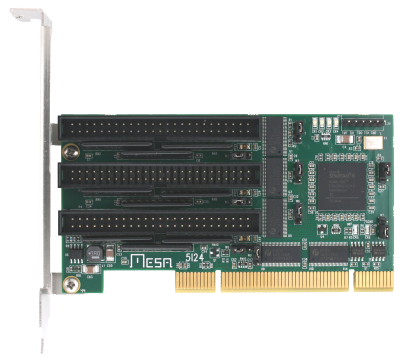
The
MESA 5I24 is a low cost, general purpose, FPGA based programmable I/O card for the
PCI bus. The 5I24 is a
low profile PCI card (available with low profile and standard brackets, standard profile bracket shown here)
Dual FPGA configuration EEPROMs allow simple recovery from programming mistakes. Firmware modules
are provided for hardware step generation, quadrature encoder
counting, PWM generation, digital
I/O, Smart Serial remote I/O, BISS, SSI, SPI, UART interfaces and
more. All motion control firmware is open source and easily modified to
support new functions or different mixes of functions. All I/O bits are 5V tolerant and can sink
24 mA. All I/O pins support 3.3V LVDS signaling. Pullup resistors are
provided for all pins so that they may be
connected
directly to opto-isolators, contacts etc. The 5I24 has 72
I/O bits available on three 50 pin connectors, all connectors use I/O
module rack compatible pinouts and are compatible with all Mesa 50 pin FPGA daughtercards.
MANUAL SUPPORT SOFTWARE
6I24
FPGA based PCIE
Anything I/O card 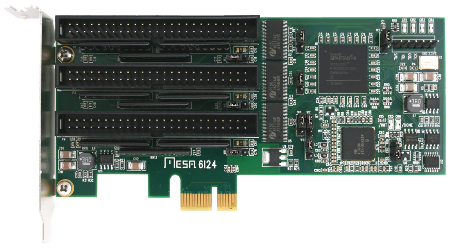
The
MESA 6I24 is a low cost, general purpose, FPGA based programmable I/O card for the
PCIE bus. The 6I24 is a
low profile one lane PCIE card (available with low profile and standard brackets, low profile bracket shown here) Firmware modules
are provided for hardware step generation, quadrature encoder
counting, PWM generation, digital
I/O, Smart Serial remote I/O, BISS, SSI, SPI, UART interfaces and
more. All motion control firmware is open source and easily modified to
support new functions or different mixes of functions. All I/O bits are 5V tolerant and can sink
24 mA. All I/O pins support 3.3V LVDS signaling. Pullup resistors are
provided for all pins so that they may be
connected
directly to opto-isolators, contacts etc. The 6I24 has 72
I/O bits available on three 50 pin connectors, all connectors use I/O
module rack compatible pinouts and are compatible with all Mesa 50 pin FPGA daughtercards.
MANUAL SUPPORT SOFTWARE
5I25 Superport FPGA based PCI
Anything I/O card
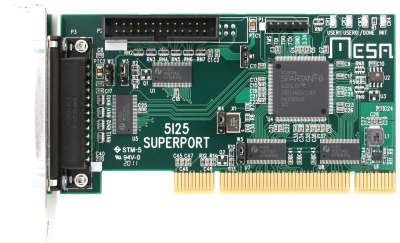
The
MESA 5I25 is a low cost, general purpose, FPGA based programmable I/O card for the
PCI bus. The 5I25 is a
low profile PCI card (available with low profile and standard brackets, low profile bracket shown here)
that uses standard parallel port pinouts and connectors
for compatibilty with most parallel port interfaced motion control /
CNC breakout cards/ multi axis step motor drives, allowing a motion
control performance boost while retaining a reliable real time PCI
interface. Unlike the parallel port that the 5I25 replaces, each I/O
bit has individually programmable direction and function. The 5I25 is a
universal PCI card so
will work in 5V and 3.3V systems. the 5I25 provides 34 I/O bits (17 per
connector) All I/O bits are 5V tolerant and have pullup resistors. A
power source option allows the 5I25 to supply 5V power to breakout
boards if desired. This 5V power is protected by a PTC. Firmware modules
are provided for hardware step generation, quadrature encoder
counting, PWM generation, digital
I/O, Smart Serial remote I/O, BISS, SSI, SPI, UART interfaces and
more. Configurations are available that are compatible with
common breakout cards and multi axis step motor drives like the Gecko
G540. All motion control firmware is open source and easily modified to
support new functions or different mixes of functions.
There are
currently six
5I25 compatible breakout cards available from Mesa, the 7I74 through
7I78 and 7I85. The 7I76 is
a step/dir oriented breakout with 5 axis of buffered step/dir outputs,
one spindle encoder input, one
isolated 0-10V analog spindle speed plus isolated direction and enable
outputs, one RS-422 expansion port, 32 isolated 5-32V inputs and 16
isolated 5-32V 300 mA outputs. The 7I77 is a analog servo interface
with 6 encoder inputs, 6 analog +-10V outputs, one RS-422 expansion
port, 32 isolated 5-32V inputs, and 16 isolated 5-32V 300 mA outputs. The 5I25
supports two breakout cards so for example a 10 Axis step/dir
configuration or 12 axis analog servo configuration is possible with a
single 5I25 and two Mesa breakout cards.
MANUAL---SUPPORT SOFTWARE
6I25 Superport FPGA based PCIE
Anything I/O card
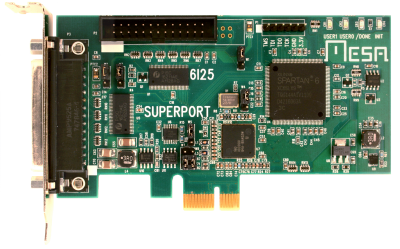
The
MESA 6I25 is a low cost, general purpose, FPGA based programmable I/O card for the PCIE bus. The 6I25 is a
low profile one lane PCIE card (available with low profile and standard brackets, low profile bracket shown here)
that uses standard parallel port pinouts and connectors
for compatibilty with most parallel port interfaced motion control /
CNC breakout cards/ multi axis step motor drives, allowing a motion
control performance boost while retaining a reliable real time PCI-Express
interface. Unlike the parallel port that the 6I25 replaces, each I/O
bit has individually programmable direction and function. The 6I25 provides 34 I/O bits (17 per
connector) All I/O bits are 5V tolerant and have pullup resistors. A
power source option allows the 6I25 to supply 5V power to breakout
boards if desired. This 5V power is protected by a PTC. Firmware modules
are provided for hardware step generation, quadrature encoder
counting, PWM generation, digital
I/O, Smart Serial remote I/O, BISS, SSI, SPI, UART interfaces and
more. Configurations are available that are compatible with
common breakout cards and multi axis step motor drives like the Gecko
G540. All motion control firmware is open source and easily modified to
support new functions or different mixes of functions.
There are
currently six 6I25 compatible breakout cards available from Mesa, the 7I74 through
7I78 and 7I85. The 7I76 is
a step/dir oriented breakout with 5 axis of buffered step/dir outputs,
one spindle encoder input, one
isolated 0-10V analog spindle speed plus isolated direction and enable
outputs, one RS-422 expansion port, 32 isolated 5-32V inputs and 16
isolated 5-32V 300 mA outputs. The 7I77 is a analog servo interface
with 6 encoder inputs, 6 analog +-10V outputs, one RS-422 expansion
port, 32 isolated 5-32V inputs, and 16 isolated 5-32V 300 mA outputs. The 6I25
supports two breakout cards so for example a 10 Axis step/dir
configuration or 12 axis analog servo configuration is possible with a
single 6I25 and two Mesa breakout cards.
MANUAL---SUPPORT SOFTWARE
5I25/6I25 + DAUGHTERCARD + CABLE PLUG-AND-GO KITS
The 5I25 and 6I25 are avalilable in
kits with selected daughtercards and the interconnecting cable. Because
the supplied cable is guaranteed to be compatible with the 5I25/6I25 and
daughtercard, its advantageous for Mesa (fewer field problems) and the
customer (the kit price is discounted from the individual component prices)
to purchase the kit. Currently kits are available with the 7I76 (shown
here) and 7I77 daughtercards.
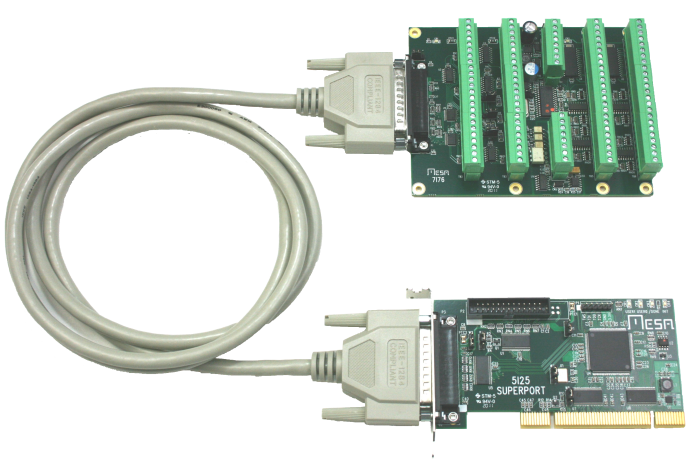
7C80 RPI interfaced Step&dir plus I/O interface
The
MESA 7C80 is FPGA motherboard host for a Raspberry Pi CPU. The 7C80
connects to the GPIO interface and uses SPI for FPGA communication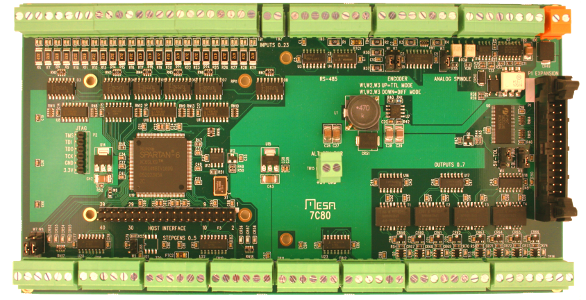
The 7C80 provides 5V power for the RPI via a built in switching
regulator. The 7C80 has 6 channels of differential Step/dir outputs
with step rates up to 10 MHz. 24 isolated inputs are provided for general control use
including limit switch, control panel inputs, and up to 4 MPGs. Inputs operate with 4V
to 36V DC and have 2 independent positive or negative commons for sourcing or
sinking input applications. Eight
36V 2A isolated outputs allow sinking,
sourcing, or combinations of both. Spindle control includes a high speed differential or
single-ended encoder input for spindle feedback and an isolated
analog spindle interface with real time speed and direction
control. A RS-422/RS-485 interface is provided for
I/O expansion via a serial I/O daughtercards or general RS-422/RS-485 use. In addition to the
on card I/O, A FPGA expansion connector compatible with Mesa's 25 pin
daughtercards or standard parallel port breakout boards allow almost
unlimited I/O options including additional quadrature or absolute
encoder inputs, step/dir or PWM/dir outputs, and field I/O expansion to
hundreds of I/O points. All field wiring is terminated in
pluggable 3.5 mm screw terminal blocks. The 7C80 mounts in standard 107 mm DIN tray and is powered by 8 to 40V DC
MANUAL SUPPORT SOFTWARE
7C81 RPI interfaced FPGA card
The
MESA 7C81 is FPGA motherboard host for a Raspberry Pi CPU. The 7C81
connects to the RPI's GPIO interface and uses SPI for FPGA communication.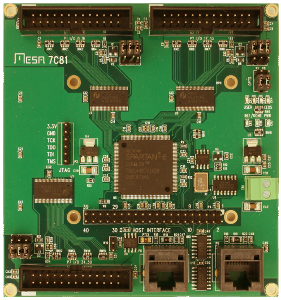
Three 26 pin header connectors with standard parallel port pinouts are provided for compatibility with most parallel port interfaced motion control /
CNC breakout cards/ multi axis step motor drives, including Mesa's 25 pin breakout boards. Mesa's 25 pin
daughtercards or standard parallel port breakout boards allow almost
unlimited I/O options including quadrature or absolute
encoder inputs, step/dir (to 10 MHz) or PWM/dir outputs, and field I/O expansion to
hundreds of I/O points. In
addition to the parallel expansion ports, the 7C81 provides two
RS-422/RS-485 interfaces for I/O expansion via serial I/O
daughtercards or other RS-422/RS-485 applications. The
7C81 mounts in standard 107 mm DIN tray and is powered by 5V
DC.
MANUAL SUPPORT SOFTWARE
7I92(M,H) Ethernet
Anything I/O card
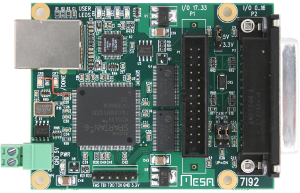
The
MESA 7I92 is a low cost, general purpose, FPGA based programmable I/O card with 100 BaseT Ethernet host connection.
The 7I92 uses standard parallel port pinouts and connectors
for compatibilty with most parallel port interfaced motion control /
CNC breakout cards/ multi axis step motor drives, allowing a motion
control performance boost while retaining a reliable
real time Ethernet
interface. Unlike the parallel port that the 7I92 replaces, each I/O
bit has individually programmable direction and function. The 7I92
has a simplified UDP host data transfer system that allows operation
in real time if required and compability with standard networks for non-real time applications. The 7I92 provides 34 I/O bits (17 per
connector) All I/O bits are 5V tolerant and have pullup resistors. A
power source option allows the 7I92 to supply 5V power to breakout
boards if desired. Firmware modules
are provided for hardware step generation, quadrature encoder
counting, PWM generation, digital
I/O, Smart Serial remote I/O, BISS, SSI, SPI, UART interfaces and
more. Configurations are available that are compatible with
common breakout cards and multi axis step motor drives like the Gecko
G540 and Leadshine MX3660. All motion control firmware is open source and easily modified to
support new functions or different mixes of functions.
There are
currently six 7I92 compatible breakout cards available from Mesa, the 7I74 through
7I78 and 7I85. The 7I76 is
a step/dir oriented breakout with 5 axis of buffered step/dir outputs,
one spindle encoder input, one
isolated 0-10V analog spindle speed plus isolated direction and enable
outputs, one RS-422 expansion port, 32 isolated 5-32V inputs and 16
isolated 5-32V 300 mA outputs. The 7I77 is a analog servo interface
with 6 encoder inputs, 6 analog +-10V outputs, one RS-422 expansion
port, 32 isolated 5-32V inputs, and 16 isolated 5-32V 300 mA outputs.
The7I92
supports two breakout cards so for example a 10 Axis step/dir
configuration or 12 axis analog servo configuration is possible with a
single 7I92 and two Mesa breakout cards. There are three 7I92 variants,
the 7I92, 7I92H and 7I92M. The only difference is in the primary I/O
connector: 7I92=DB25F, 7I92H=HDR26, 7I92M=DB25M, the secondary I/O
connector is always a HDR26.
MANUAL SUPPORT SOFTWARE
7I92T(F,M,H) Ethernet
Anything I/O card
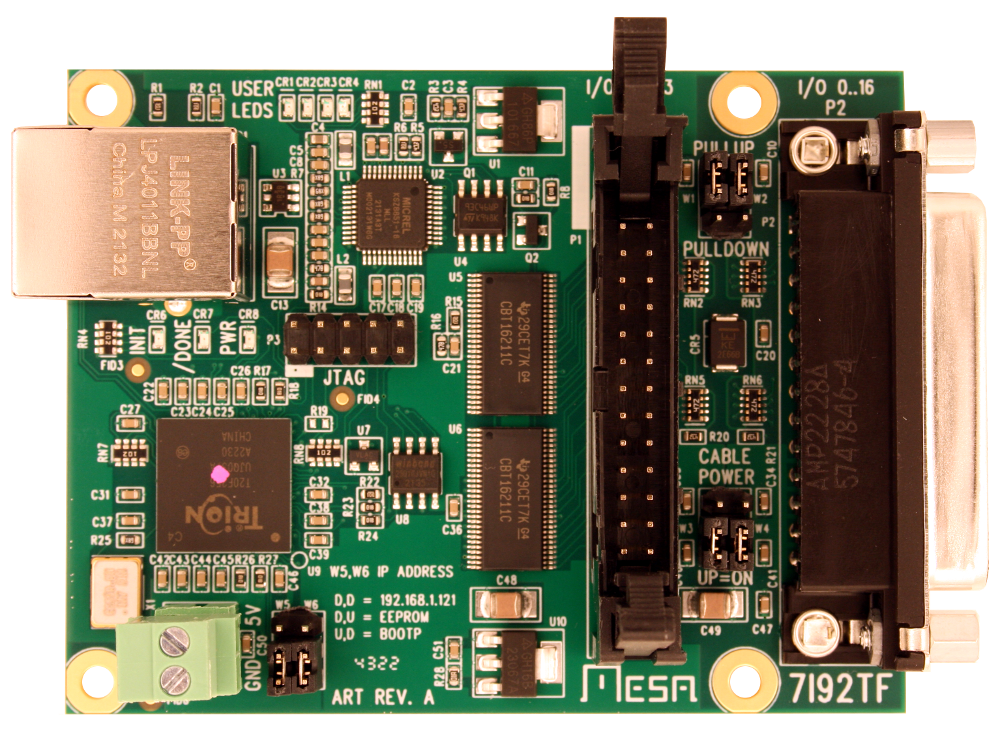
The
MESA 7I92T is a low cost, general purpose, FPGA based programmable I/O card with 100 BaseT Ethernet host connection. The
7I92T series replaces the 7I92 series cards. Enhanced features include
a larger FPGA, better Ethernet ESD protection, and a pullup/pull down
option for the I/O pins. The 7I92T uses standard parallel port pinouts and connectors
for compatibilty with most parallel port interfaced motion control /
CNC breakout cards/ multi axis step motor drives, allowing a motion
control performance boost while retaining a reliable
real time Ethernet
interface. Unlike the parallel port that the 7I92T replaces, each I/O
bit has individually programmable direction and function. The 7I92T
has a simplified UDP host data transfer system that allows operation
in real time if required and compability with standard networks for non-real time applications. The 7I92T provides 34 I/O bits (17 per
connector) All I/O bits are 5V tolerant and have pullup resistors. A
power source option allows the 7I92T to supply 5V power to breakout
boards if desired. Firmware modules
are provided for hardware step generation, quadrature encoder
counting, PWM generation, digital
I/O, Smart Serial remote I/O, BISS, SSI, SPI, UART interfaces and
more. Configurations are available that are compatible with
common breakout cards and multi axis step motor drives like the Gecko
G540 and Leadshine MX3660. All motion control firmware is open source and easily modified to
support new functions or different mixes of functions.
There are
currently six 7I92T compatible breakout cards available from Mesa, the 7I74 through
7I78 and 7I85. The 7I76 is
a step/dir oriented breakout with 5 axis of buffered step/dir outputs,
one spindle encoder input, one
isolated 0-10V analog spindle speed plus isolated direction and enable
outputs, one RS-422 expansion port, 32 isolated 5-32V inputs and 16
isolated 5-32V 300 mA outputs. The 7I77 is a analog servo interface
with 6 encoder inputs, 6 analog +-10V outputs, one RS-422 expansion
port, 32 isolated 5-32V inputs, and 16 isolated 5-32V 300 mA outputs.
The7I92T
supports two breakout cards so for example a 10 Axis step/dir
configuration or 12 axis analog servo configuration is possible with a
single 7I92T and two Mesa breakout cards. There are three 7I92T variants,
the 7I92TF, 7I92TH and 7I92TM. The only difference is in the primary I/O
connector: 7I92TF=DB25F, 7I92TH=HDR26, 7I92TM=DB25M, the secondary I/O
connector is always a HDR26.
MANUAL SUPPORT SOFTWARE
7I80DB Ethernet
Anything I/O card
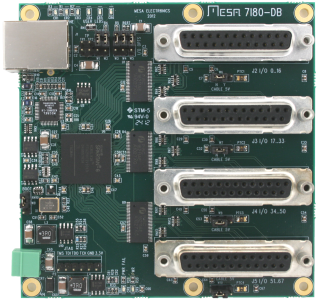
The
MESA 7I80DB is a low cost, general purpose, FPGA based programmable I/O card with 100 BaseT Ethernet host connection.
The 7I80DB uses standard parallel port pinouts and connectors
for compatibilty with most parallel port interfaced motion control /
CNC breakout cards/ multi axis step motor drives, allowing a motion
control performance boost while retaining a reliable
real time Ethernet
interface. Unlike the parallel port that the 7I80DB replaces, each I/O
bit has individually programmable direction and function. The 7I80DB
has a simplified UDP host data transfer system that allows operation
in real time if required and compability with standard networks for non-real time applications. Dual FPGA configuration EEPROMs allow simple recovery from programming mistakes. The 7I80DB provides 68 I/O bits (17 per
connector) All I/O bits are 5V tolerant and have pullup resistors. A
power source option allows the 7I80DB to supply 5V power to breakout
boards if desired. This 5V power is protected by a PTC. Firmware modules
are provided for hardware step generation, quadrature encoder
counting, PWM generation, digital
I/O, Smart Serial remote I/O, BISS, SSI, SPI, UART interfaces and
more. Configurations are available that are compatible with
common breakout cards and multi axis step motor drives like the Gecko
G540 and Leadshine MX3660. All motion control firmware is open source and easily modified to
support new functions or different mixes of functions.
There are
currently six 7I80DB compatible breakout cards available from Mesa, the 7I74 through
7I78 and 7I85. The 7I76 is
a step/dir oriented breakout with 5 axis of buffered step/dir outputs,
one spindle encoder input, one
isolated 0-10V analog spindle speed plus isolated direction and enable
outputs, one RS-422 expansion port, 32 isolated 5-32V inputs and 16
isolated 5-32V 300 mA outputs. The 7I77 is a analog servo interface
with 6 encoder inputs, 6 analog +-10V outputs, one RS-422 expansion
port, 32 isolated 5-32V inputs, and 16 isolated 5-32V 300 mA outputs. The7I80DB
supports four breakout cards so for example a 20 Axis step/dir
configuration or 24 axis analog servo configuration is possible with a
single 7I80DB and four Mesa breakout cards.
MANUAL SUPPORT SOFTWARE
7I80HD Ethernet
Anything I/O card
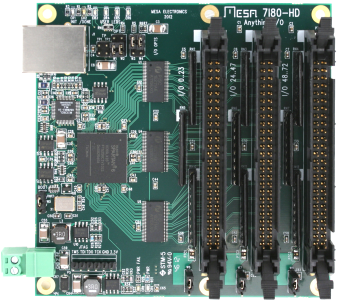
The
MESA 7I80HD is a low cost, general purpose, FPGA based programmable I/O card with 100 BaseT Ethernet host connection. The 7I80HD
has a simplified UDP host data transfer system that allows operation
in real time if required and compability with standard networks for non-real time applications. Dual FPGA configuration EEPROMs allow simple recovery from programming mistakes. Firmware modules
are provided for hardware step generation, quadrature encoder
counting, PWM generation, digital
I/O, Smart Serial remote I/O, BISS, SSI, SPI, UART interfaces and
more. All motion control firmware is open source and easily modified to
support new functions or different mixes of functions. All I/O bits are 5V tolerant and can sink
24 mA. All I/O pins support 3.3V LVDS signaling. Socketed pullup resistors are
provided for all pins so that they may be
connected
directly to opto-isolators, contacts etc. The 7I80HD
has 72
I/O bits available on three 50 pin connectors, all connectors use I/O
module rack compatible pinouts and are compatible with all Mesa 50 pin FPGA daughtercards.
MANUAL SUPPORT SOFTWARE
7I93 Ethernet
Anything I/O card
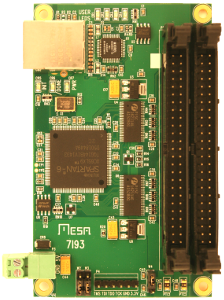
The
MESA 7I93 is a low cost, general purpose, FPGA based programmable I/O card with 100 BaseT Ethernet host connection. The 7I93
has a simplified UDP host data transfer system that allows operation
in real time if required and compability with standard networks for non-real time applications. Firmware modules
are provided for hardware step generation, quadrature encoder
counting, PWM generation, digital
I/O, Smart Serial remote I/O, BISS, SSI, SPI, UART interfaces and
more. All motion control firmware is open source and easily modified to
support new functions or different mixes of functions. All I/O bits are 5V tolerant and can sink
24 mA. All I/O pins support 3.3V LVDS signaling. Socketed pullup resistors are
provided for all pins so that they may be
connected
directly to opto-isolators, contacts etc. The 7I93
has 48
I/O bits available on two 50 pin connectors, all connectors use I/O
module rack compatible pinouts and are compatible with all Mesa 50 pin FPGA daughtercards.
MANUAL SUPPORT SOFTWARE
7I90HD Parallel/SPI
Anything I/O card
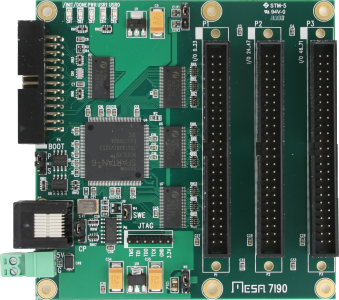
The
MESA 7I90HD is a very low cost, general purpose, FPGA based programmable I/O card with a EPP parallel, RS-422 serial or SPI host interface. Dual FPGA configuration EEPROMs allow simple recovery from programming mistakes. Firmware modules
are provided for hardware step generation, quadrature encoder
counting, PWM generation, digital
I/O, Smart Serial remote I/O, BISS, SSI, SPI, UART interfaces and
more. All motion control firmware is open source and easily modified to
support new functions or different mixes of functions. All I/O bits are 5V tolerant and can sink
24 mA. All I/O pins support 3.3V LVDS signaling. Pullup resistors are
provided for all pins so that they may be
connected
directly to opto-isolators, contacts etc. The 7I90HD
has 72
I/O bits available on three 50 pin connectors, all connectors use I/O
module rack compatible pinouts and are compatible with all Mesa 50 pin FPGA daughtercards.
MANUAL SUPPORT SOFTWARE
7I76E Ethernet interfaced Step&dir plus I/O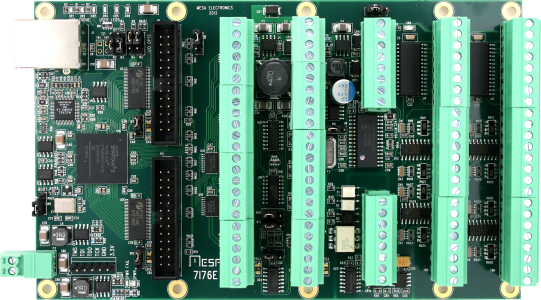 interface
interface
The 7I76E is a remote FPGA card with Ethernet interface designed
for interfacing up to 5 Axis of step&dir step motor or servo
motor drives. The 7I76E also provides a spindle encoder interface, isolated
analog spindle speed control and 48 isolated I/O points for general
purpose field I/O use. All step and direction outputs are buffered 5V
signals that can drive 24 mA. All outputs support
differential mode to reduce susceptibility to noise. An
isolated analog spindle voltage with direction and enable outputs is
provided for spindle control as is a single spindle encoder channel
with TTL or differential inputs. 48 points of isolated field I/O are
provided for general control use including limit switch and control
panel inputs, coolant enable and tool changer control outputs.
Isolated I/O includes 32 sinking inputs and 16 sourcing outputs. Inputs
can sense 5V to 32V signals and the outputs can switch 5V through 28V
signals. Maximum output load is 300 mA.
Outputs are short circuit protected. In
addition to the being able to read digital on/off status of each
input, four input pin voltages are readable with 8 bit
resolution, and two MPG encoder inputs are provided as an option
on four field inputs.
Field I/O is powered by an
isolated 10-32V field power source.
One
RS-422 interface is provided for I/O expansion via a serial I/O
daughtercard. In addition to the on card I/O, two FPGA expansion
connectors compatible with Mesa's 25 pin daughtercards allow almost
unlimited I/O options including additional quadrature encoder inputs,
absolute encoder inputs, step/dir outputs, field I/O expansion
etc. All field wiring is terminated in
pluggable 3.5 mm
screw terminal blocks.
MANUAL SUPPORT SOFTWARE
7I94 Ethernet interfaced 8 channel RS-422/RS-485 I/O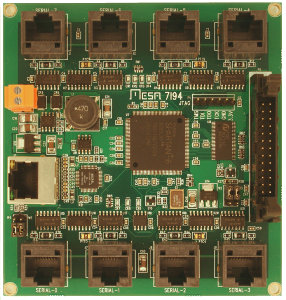 interface
interface
The 7I94 is a Ethernet connected motion control
interface designed for interfacing up to eight high speed RS-422
or RS-485 serial
devices including Mesa sserial remote interfaces, absolute encoders and
general serial interfacing. In addition, a FPGA expansion
connector compatible with Mesa's 25 pin
daughtercards or standard parallel port breakout boards allow almost
unlimited I/O options including additional quadrature or absolute
encoder inputs, step/dir or PWM/dir outputs, and field I/O expansion to
hundreds of I/O points. The 7I94 mounts in standard 107 mm DIN rail
channels and is powered by 8 to 40V DC
MANUAL SUPPORT SOFTWARE
7I95 Ethernet interfaced Step&dir&encoder plus I/O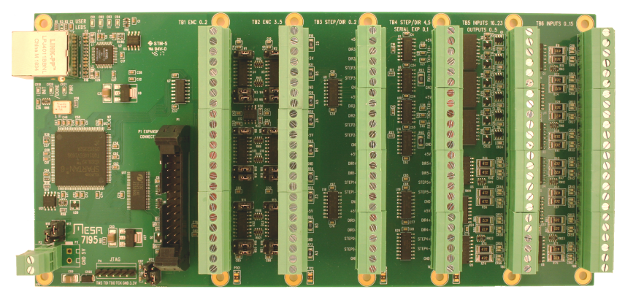 interface
interface
The 7I95 is a Ethernet connected motion control
interface designed for interfacing up to 6 Axis of step&dir
step motor or servo motor drives and includes encoder feedback for each axis. Step rates up to 10 MHz are
supported. The 7I95 also has 24 isolated inputs plus 6 isolated outputs
for general purpose I/O use. 6 high speed encoder interfaces are provided
axis feedback and for spindle synchronized motion. Two RS-422/RS485 serial expansion
ports and a parallel expansion port are also provided.
All step and direction outputs are buffered 5V
signals that can drive 24 mA. All outputs support differential
mode to reduce susceptibility to noise. The encoders can
be used with TTL or differential input.
24 isolated inputs are provided for general control use
including limit switch and control panel inputs. Inputs operate with 3V
to 36V DC and can have a positive or negative common for sourcing or
sinking input applications. 8 inputs can be used to support up to 4 quadrature MPGs.
Six 36V 2A isolated outputs allow sinking,
sourcing combinations of both.
Two RS-422/RS-485 interface is provided for
I/O expansion via a serial I/O daughtercard. In addition to the
on card I/O, A FPGA expansion connector compatible with Mesa's 25 pin
daughtercards or standard parallel port breakout boards allow almost
unlimited I/O options including additional quadrature or absolute
encoder inputs, step/dir or PWM/dir outputs, and field I/O expansion to
hundreds of I/O points. All field wiring is terminated in
pluggable 3.5 mm screw terminal blocks. The 7i95 runs from a single 5V supply
MANUAL SUPPORT SOFTWARE
7I96 Ethernet interfaced Step&dir plus I/O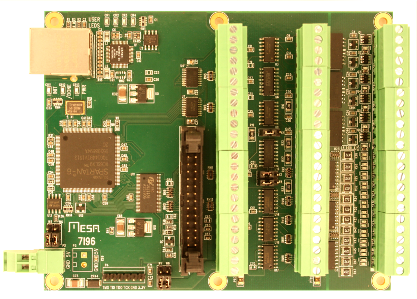 interface
interface
The 7I96 is a Ethernet connected motion control
interface designed for interfacing up to 5 Axis of step&dir
step motor or servo motor drives. Step rates up to 10 MHz are
supported. The 7I96 also has 11 isolated inputs plus 6 isolated outputs
for general purpose I/O use. A high speed encoder interface is provided
for spindle synchronized motion. A RS-422/RS485 serial expansion
port and a parallel expansion port are also provided.
All step and direction outputs are buffered 5V
signals that can drive 24 mA. All outputs support differential
mode to reduce susceptibility to noise. The spindle encoder can
be used with TTL or differential input.
11 isolated inputs are provided for general control use
including limit switch and control panel inputs. Inputs operate with 3V
to 36V DC and can have a positive or negative common for sourcing or
sinking input applications. Six 36V 2A isolated outputs allow sinking,
sourcing combinations of both.
One RS-422/RS-485 interface is provided for
I/O expansion via a serial I/O daughtercard. In addition to the
on card I/O, A FPGA expansion connector compatible with Mesa's 25 pin
daughtercards or standard parallel port breakout boards allow almost
unlimited I/O options including additional quadrature or absolute
encoder inputs, step/dir or PWM/dir outputs, and field I/O expansion to
hundreds of I/O points. All field wiring is terminated in
pluggable 3.5 mm screw terminal blocks. The 7i96 runs from a single 5V supply
MANUAL SUPPORT SOFTWARE
7I96S Ethernet interfaced Step&dir plus I/O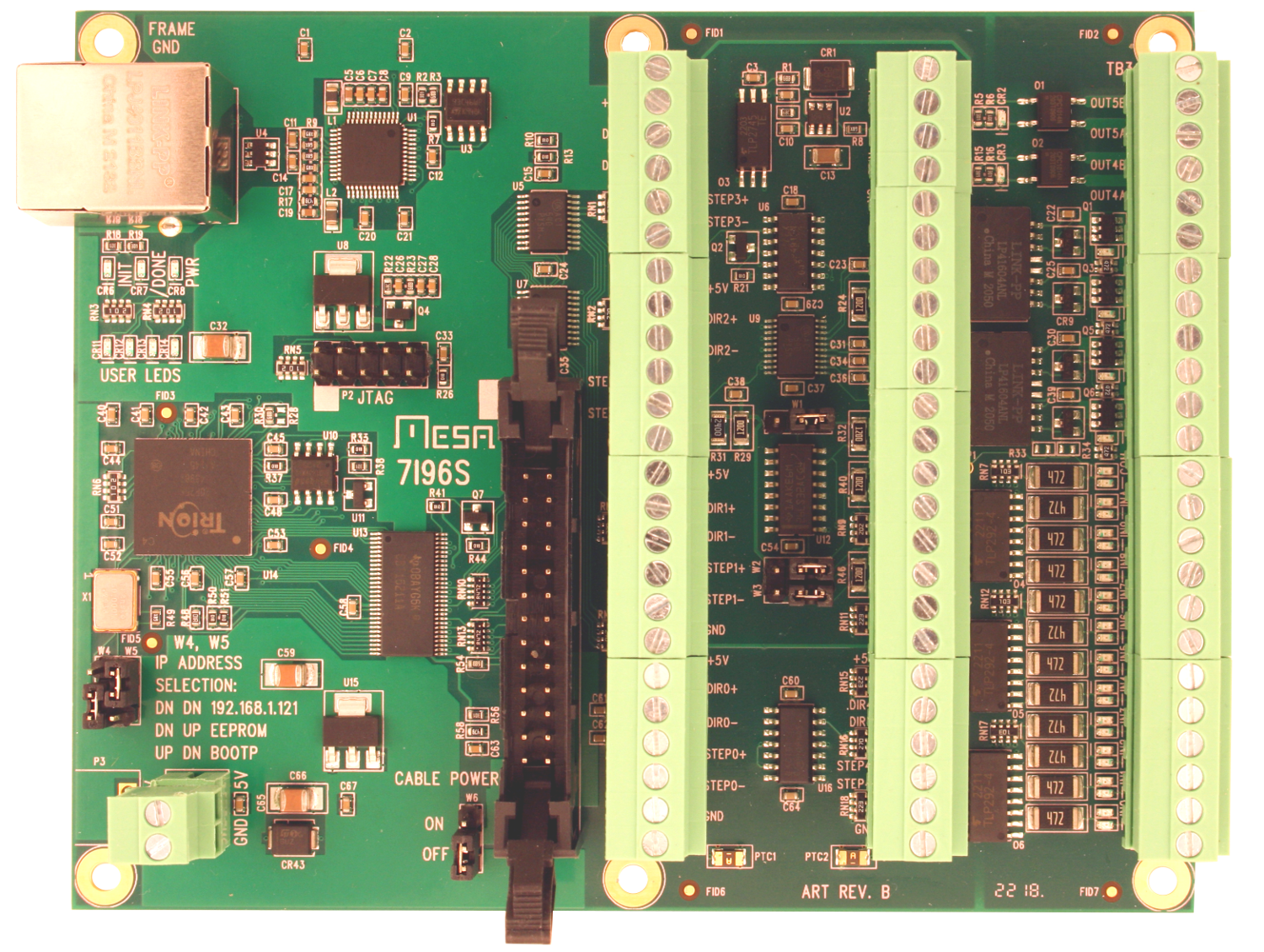 interface
interface
The 7I96S is a Ethernet connected
motion control interface designed for interfacing up to 5 Axis of
step and direction step motor or servo motor drives. Step rates up to
10 MHz are supported. The 7I96S also has 11 isolated inputs plus 6
isolated outputs for general purpose I/O use. A high speed encoder
interface is provided for spindle synchronized motion and an isolated
analog output is provided for spindle speed control. I/O expansion
includes a RS-422/RS485 serial port and a parallel expansion port
compatible with Mesa 25 pin daughtercards and standard parallel port
breakouts.
All step and direction outputs are buffered 5V
signals that can drive 24 mA. All outputs support differential
mode to reduce susceptibility to noise. The spindle encoder can
be used with TTL or differential input.
11 isolated inputs provided for general control use
including limit switch and control panel inputs. Inputs operate with 4V
to 36V DC and can have a positive or negative common for sourcing or
sinking input applications. Six 36V isolated outputs allow sinking,
sourcing combinations of both. Two of the outputs are high isolation
(300V) low current (100 mA) AC SSRs for spindle or plasma control,
while 4 outputs are high current (2A) DC SSRS for general purpose use.
One RS-422/RS-485 interface is provided for
I/O expansion via a serial I/O daughtercard. In addition to the
on card I/O, A FPGA expansion connector compatible with Mesa's 25 pin
daughtercards or standard parallel port breakout boards allow almost
unlimited I/O options including additional quadrature or absolute
encoder inputs, step/dir or PWM/dir outputs, and field I/O expansion to
hundreds of I/O of points. All field wiring is terminated in
pluggable 3.5 mm screw terminal blocks.
MANUAL SUPPORT SOFTWARE
7I97 Ethernet interfaced Analog servo plus I/O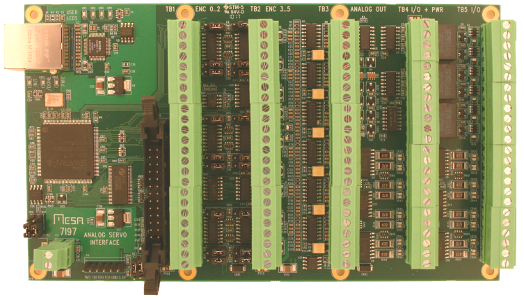 interface
interface
The 7I97 is a Ethernet connected motion control
interface designed for interfacing up to 6 Axis of analog servo
motor drives and includes encoder feedback for each axis. The 7I97 has
6 +-10V analog outputs and 6 drive enable outputs. The 7I97 also has 16
isolated inputs plus 6 isolated outputs
for general purpose I/O use. 6 high speed encoder interfaces are
provided
axis feedback and for spindle synchronized motion. A RS-422/RS485
serial expansion
ports and a parallel expansion port are also provided. The
encoders can
be used with TTL or differential input.
16 isolated inputs are provided for general control use
including limit switch and control panel inputs. Inputs operate with 3V
to 36V DC and can have a positive or negative common for sourcing or
sinking input applications. 8 inputs can be used to support up to 4 quadrature MPGs.
Six 36V 2A isolated outputs allow sinking,
sourcing combinations of both.
A RS-422/RS-485 interface is provided for
I/O expansion via a serial I/O daughtercard. In addition to the
on card I/O, A FPGA expansion connector compatible with Mesa's 25 pin
daughtercards or standard parallel port breakout boards allow almost
unlimited I/O options including additional quadrature or absolute
encoder inputs, step/dir or PWM/dir outputs, and field I/O expansion to
hundreds of I/O points. All field wiring is terminated in
pluggable 3.5 mm screw terminal blocks. The 7i97 runs from a single 5V supply
MANUAL SUPPORT SOFTWARE
7I98 Ethernet
Anything I/O card
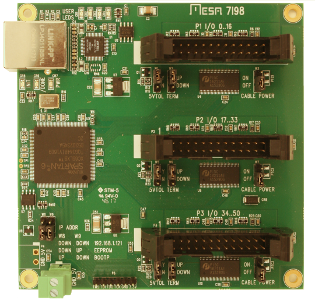
The
MESA 7I98 is a low cost, general purpose, FPGA based programmable I/O card with 100 BaseT Ethernet host connection.
The 7I98 uses standard parallel port pinouts and and provides 3 connectors compatible with most parallel port interfaced motion control /
CNC breakout cards/ multi axis step motor drives, allowing a motion
control performance boost while retaining a reliable
real time Ethernet
interface. Unlike the parallel port that the 7I98 replaces, each I/O
bit has individually programmable direction and function. The 7I98
has a simplified UDP host data transfer system that allows operation
in real time if required and compability with standard networks for non-real time applications. The 7I98 provides 51 I/O bits (17 per
connector x 3 connectors). All I/O bits are 5V tolerant and have pullup or pulldown resistors. A
power source option allows the 7I98 to supply 5V power to breakout
boards if desired. Firmware modules
are provided for hardware step generation, quadrature encoder
counting, PWM generation, digital
I/O, Smart Serial remote I/O, BISS, SSI, SPI, UART interfaces and
more. Configurations are available that are compatible with
common breakout cards and multi axis step motor drives like the Gecko
G540 and Leadshine MX3660. All motion control firmware is open source and easily modified to
support new functions or different mixes of functions.
MANUAL SUPPORT SOFTWARE
5I22
FPGA based PCI
Anything I/O card
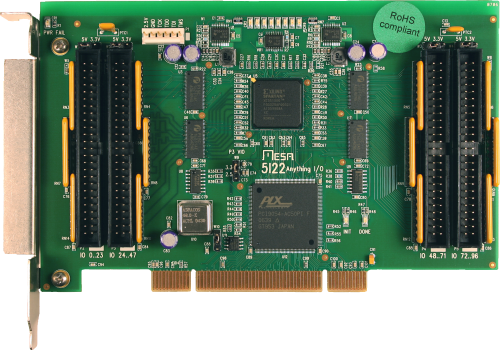
The MESA 5I22 is a general
purpose programmable I/O card
for the
PCI bus. The 5I22 uses a 1 or 1.5M gate Xilinx FPGA for all
logic, so
it is truly an Anything I/O card. The FPGA is downloadable from the PCI
bus side, allowing creation of almost any kind of specialized I/O
function, including micro-controllers in the FPGA.
Several pre-made functions are provided, including a 16
channel
host based servo motor controller, a 4 or 8 channel
micro-controller based servo motor controller (DSP
built into FPGA), and a 8 channel, 32 bit timer counter card capable of
running at 200 MHz. VHDL source is provided for all
examples. All I/O bits are 5V tolerant and can sink
24 mA.
One connector supports LVDS signaling on 10 pairs. Pullup resistors are
provided for all pins so that they may be
connected
directly to opto-isolators, contacts etc. The 5I22
has 96
I/O bits available on four 50 pin connectors, all connectors use I/O
module rack compatible pinouts.
DATASHEET ---
MANUAL
---SUPPORT SOFTWARE
5I23
FPGA based PCI
Anything I/O card
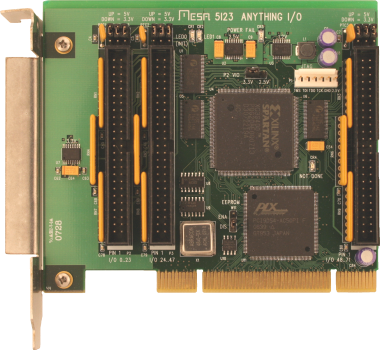
The MESA 5I23 is a general
purpose programmable I/O card
for the
PCI bus. The 5I23 uses a 400K gate Xilinx FPGA for all
logic, so
it is truly an Anything I/O card. The FPGA is downloadable from the PCI
bus side, allowing creation of almost any kind of specialized I/O
function, including micro-controllers in the FPGA.
Several pre-made functions are provided, including a 12
channel
host based servo motor controller, a 4 or 8 channel
micro-controller based servo motor controller (DSP
built into FPGA), and a 8 channel, 32 bit timer counter card capable of
running at 100 MHz. VHDL source is provided for all
examples. All I/O bits are 5V tolerant and can sink
24 mA.
One connector supports LVDS signaling on 10 pairs. Pullup resistors are
provided for all pins so that they may be
connected
directly to opto-isolators, contacts etc. The 5I23
has 72
I/O bits available on three 50 pin connectors, all connectors use I/O
module rack compatible pinouts.
DATASHEET ---
MANUAL
---SUPPORT SOFTWARE
5I20
FPGA based PCI
Anything I/O card
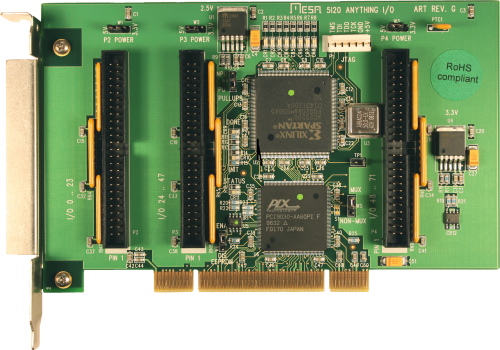
The MESA 5I20 is a general purpose programmable I/O card for
the
PCI bus. The 5I20 uses a 200K gate Xilinx FPGA for all logic,
so
it is truly an Anything I/O card. The FPGA is downloadable from the PCI
bus side, allowing creation of almost any kind of specialized I/O
function, even including micro-controllers in the
FPGA.
Several pre-made functions are provided, including a 12
channel
host based servo motor controller, a 4 or 8 channel
micro-controller based servo motor controller (micro-controller CPU
built into FPGA), and a 8 channel, 32 bit timer counter card capable of
running at 100 MHz. VHDL source is provided for all
examples. All I/O bits are 5V tolerant and can sink
24 mA.
Pullup resistors are provided for all pins so that they may be
connected
directly to opto-isolators, contacts etc. The 5I20
has 72
I/O bits available on three 50 pin connectors, all connectors use I/O
module rack compatible pinouts.
DATASHEET
---
MANUAL---SUPPORT SOFTWARE
5I21
FPGA based PCI
RS-422/RS-485 I/O card
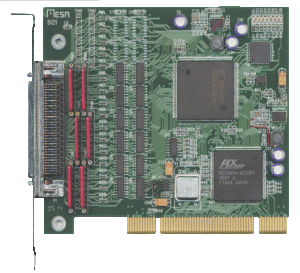
The MESA 5I21 is a programmable serial interface
card for the
PCI bus. The 5I21 is designed for applications using RS-422 and RS-485
interfaces. The 5I21 can support up to 12 full duplex RS-422 or half
duplex RS-485 serial links with baud rates up to 10 M baud. The 5I21
uses a 400K gate Spartan3 FPGA and a bus mastering PCI bridge for high
performance. Since all serial logic is FPGA based, almost any
RS-422/RS485 protocol can be supported. The I/O connector is a 68 pin
high density type compatible with standard 100 ohm differential cables.
On card serial line termination includes idle line pullups and
pulldowns to guarantee a valid undriven input state. The 5I21 is
suitable for high performance motion control systems, Industrial I/O,
Custom
real time distributed I/O, time code generation, supporting legacy
hardware, and almost any
high speed serial interface application that requires a flexible, high
performance, universal serial interface card.
DATASHEET ---
MANUAL
---SUPPORT SOFTWARE
7I43
FPGA based USB/EPP
Anything I/O card
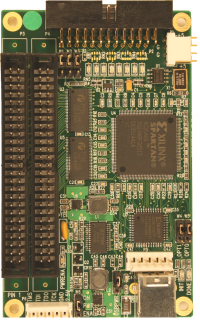
The MESA 7I43 is a low cost, general purpose programmable I/O
card that connects to the host computer via USB or PC parallel port.
The 7I43 uses a 200K or 400K gate Xilinx FPGA for all logic, so
it is truly an Anything I/O card. The FPGA is downloadable from the USB
or Parallel port
bus side, and also has the capability of local configuration storage in
an on card EEPROM. Efficient switching regulators are used for FPGA
core and 3.3V power, allowing the 7I43 to be USB bus powered. The 7I43
can also be powered by an external 5V source. A FTDI FT245R USB
interface chip is used for the USB interface. Drivers are available for
Windows and Linux. The drivers avaliable for the FT245R make the
software interface a simple buffered byte stream. Parallel port bus
interface uses EPP mode. A
50 MHz oscillator
provides the FPGA clock. This clock can be multiplied or divided in the
FPGA for other clock rates. The 7I43 has 48
I/O bits available on two 50 pin connectors. Both connectors use I/O
module rack compatible pinouts. All I/O bits are 5V tolerant, and have
series and parallel termination options (DCI). The I/O
connectors are compatible with our 7 series daughter cards for isolated
I/O, motion control and other applications. Configurations are provided
for simple GPIO, Smart Motion control (SoftDMC), host based motion
control (HostMot2), and a
waveform generator.
DATASHEET
---
MANUAL --- SUPPORT SOFTWARE
7I43H
FPGA based High Speed USB
Anything I/O card
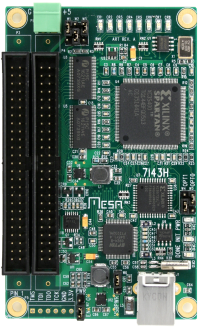
The MESA 7I43H is a low cost, general purpose programmable I/O
card that connects to the host computer via USB.
The 7I43H uses a 400K gate Xilinx FPGA for all logic, so
it is truly an Anything I/O card. The FPGA is downloadable from the
USB, and also has the capability of local configuration storage in
an on card EEPROM. Efficient switching regulators are used for FPGA
core and 3.3V power, allowing the 7I43H to be USB bus powered. The 7I43H
can also be powered by an external 5V source. A FTDI FT2232H high speed
USB
interface chip is used for the USB interface allowing transfer rates up
to 25 MBytes per second. Drivers are available for
Windows and Linux. The drivers avaliable for the FT2232H make the
software interface a simple buffered byte stream. A
50 MHz oscillator
provides the FPGA clock. This clock can be multiplied or divided in the
FPGA for other clock rates. The 7I43H has 48
I/O bits available on two 50 pin connectors. Both connectors use I/O
module rack compatible pinouts. All I/O bits are 5V tolerant, and have
series and parallel termination options (DCI). The I/O
connectors are compatible with our 7 series daughter cards for isolated
I/O, motion control and other applications. Configurations are provided
for simple GPIO, Smart Motion control (SoftDMC), host based motion
control (HostMot2), and a
waveform generator.
DATASHEET
---
MANUAL --- SUPPORT SOFTWARE
7I61
FPGA based High Speed USB
Anything I/O card
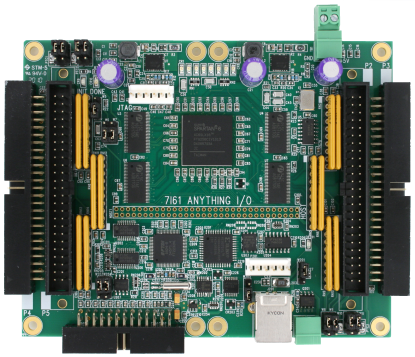
The MESA 7I61 is a low cost, general purpose programmable I/O
card that connects to the host computer via USB.
The 7I61 uses a XC6SLX16 or XC6SLX25 Xilinx FPGA for all logic, so
it is truly an Anything I/O card. The FPGA is downloadable from the
USB, and also has the capability of local configuration storage in
an on card EEPROM. Efficient switching regulators are used for FPGA
core and 3.3V power, allowing the 7I61 to be USB bus powered. The 7I61
can also be powered by an external 5V source. A FTDI FT2232H high speed
USB
interface chip is used for the USB interface allowing transfer rates up
to 25 MBytes per second. Drivers are available for
Windows and Linux. The drivers avaliable for the FT2232H make the
software interface a simple buffered byte stream. A
50 MHz oscillator
provides the FPGA clock. This clock can be multiplied or divided in the
FPGA for other clock rates. The 7I61 has 96
I/O bits available on four 50 pin connectors. Both connectors use I/O
module rack compatible pinouts. All I/O bits are 5V tolerant, LVDS signaling is supported on all an I/O pairs. The I/O
connectors are compatible with our 7 series daughter cards for isolated
I/O, motion control and other applications. Configurations are provided
for simple GPIO, Smart Motion control (SoftDMC), host based motion
control (HostMot2), and a
waveform generator.
MANUAL --- SUPPORT SOFTWARE
3X20 External PCIE
Anything I/O daughterca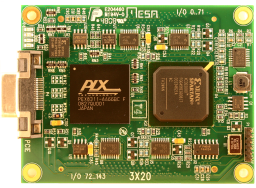 rd
rd
The MESA 3X20 is a high I/O density external PCIE FPGA card. The 3X20 has 144 user I/O available on a tiny 2.5" x 3.25" card. The 3X20 connects to the host via a standard 1 lane
PCIE cable or through its motherboard connector. All core and I/O power is regulated on card so only single
external 3.3V power supply is required. I/O pins are divided into
three banks with 48 I/O each. One bank has fixed 3.3V I/O, while the
other 2 banks can select between 1.5V, 1.8V. 2.5V or
3.3V VIO on a per bank basis. The 3X20 uses a 1M,1.5M or 2M gate Spartan3
FPGA. The FPGA interfaces to PCIE via a PLX PCIE bridge. The PCIE
bridge allows FPGA programming via the host and does not require any
FPGA bootstrap, insuring recoverability. The PCIE bridge supports host data transfer rates of greater than 150 MB/sec. On
card configuration storage is provided for stand-alone applications or
where the 3X20 must emulate a specific PCI device at power up. The PCIE
connection can be from the on card one lane cable connector or through
daughtercard connector pins (-MB option). Cabled host interface
cards are available for both PCI and PCIE hosts (the 5I71 and
6I71).
Express card cabled PCIE adapters offered by other vendors allow the
3X20 to connect to laptop computers. 96 of the 144 I/O pins support
differential
signaling. All I/O and power are connected to the motherboard via two
high speed board-board connectors. The I/O connector pinout is
reversable, allowing PCIE cable exit options. Two simple breakout
motherboard cards, the 6I68 (for 1 lane PCIE slot PC Motherboard use)
and 7I68 (for external cabled use), are available for use with the
3X20.
DATASHEET
---
MANUAL --- SUPPORT SOFTWARE
7I68 3X2X cabled PCIE motherboard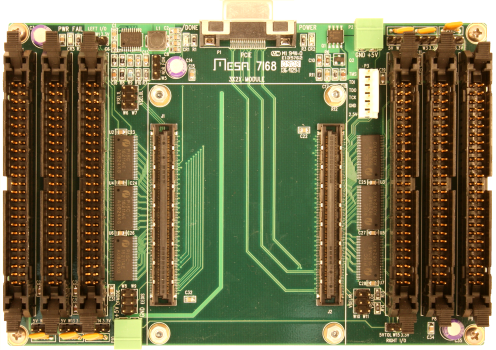
The MESA7I68 is a simple motherboard for 3X2X series FPGA
daughtercards. The 7I68 provides a base and simplified I/O connections
for the 3X2X series daughtercards. The 7I68 can be used for
evaluation of 3X2X series cards or for final application. The 7I68
buffers all I/O pins with quickwitches for 5V tolerance on all I/O, and
provides jumpers for setting the 3X2X's VIO levels and configuration
options. The 7I68 distributes the 3X2X's 144 I/O signals to six 50 pin
.1" headers with standard Anything I/O pinouts. All signal are routed
as differential pairs, allowing high speed differential signaling if
desired.The 7I68 also has an on card regulator so a single a
single 5V power supply is all thats required
DATASHEET
---
MANUAL
6I68 3X2X 1X PCIE slot motherboard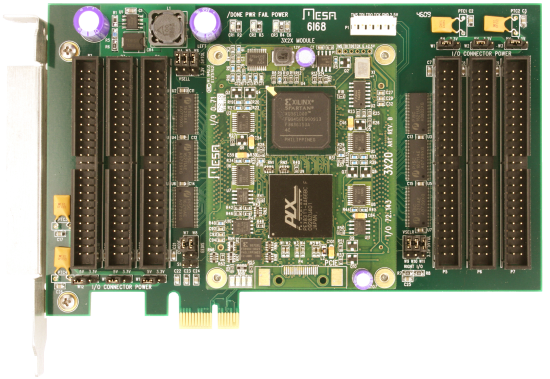
The MESA 6I68 (shown here with 3X20 installed) is a simple motherboard for 3X2X series FPGA
daughtercards that plugs into a standard one lane PCI-Express slot. The 6I68 provides a base and simplified I/O connections
for the 3X2X series daughtercards. The 6I68 can be used for
evaluation of 3X2X series cards or for final applications. The 6I68
buffers all I/O pins with quickwitches for 5V tolerance on all I/O, and
provides jumpers for setting the 3X2X's VIO levels and configuration
options. The 7I68 distributes the 3X2X's 144 I/O signals to six 50 pin
.1" headers with standard Anything I/O pinouts. All signal are routed
as differential pairs, allowing high speed differential signaling if
desired.
MANUAL
4I69
FPGA based PC104-PLUS
Anything I/O card
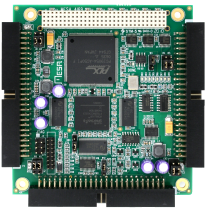
The MESA 4I69 is a general purpose programmable I/O card for
the
PCI bus. The 4I69 uses a XC6SLX16 or XC6SLXC25 Xilinx Spartan6 FPGA for all
logic, so it is truly an Anything I/O card. The
FPGA
configuration is downloadable from the PCI bus side, allowing creation
of almost any kind of specialized I/O function. The 4I69 uses a bus
mastering PCI bridge to give the card the ability to work
with
both 5V and 3.3V PCI buses and support high FPGA/PCI bus transfer
rates. Several pre-made functions are provided, including a
12
axis host based servo motor controller, a 24 channel quadrature
counter, an 8 axis micro-controller based servo motor controller
(SoftDMC), a simple 72 bit parallel I/O port, and a 12 channel, 32 bit
timer counter card capable of running at 100 MHz. VHDL source is
provided for all functions.
The
4I69 uses three 50 pin connectors with I/O module rack compatible
pin-outs and interleaved grounds. Two of the connectors support 3.3V
signals. One connector supports selectable 3.3V or 2.5V signals. All
signal pairs support LVDS signaling. A signed 12 bit 1 MSPS A-D option
with 8 inputs provides +-10V, +-5V, +-2.5V and 0 to 10V analog
input capabilities. All IO can be 5V tolerant. Each connector
provides 24 I/O bits for a total of 72 programmable I/O bits.
A
50 Mhz crystal oscillator provides a reference clock which can be
multiplied by the FPGAs DLLs for higher clock speeds. Several I/O
interface daughter cards are available for the
4I69. These cards include a 4 axis 3A Hbridge, a 2 Axis 3A stepper
motor driver, an analog servo amp. interfaces, RS-422/485 interfaces, encoder interfaces,
resolver interfaces, debug LED cards and more.
MANUAL---SUPPORT SOFTWARE
--- SOFTDMC
MANUAL
4I68
FPGA based PC104-PLUS
Anything I/O card
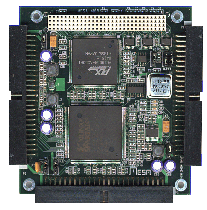
The MESA 4I68 is a general purpose programmable I/O card for
the
PCI bus. The 4I68 uses a 400K gate Xilinx Spartan3 FPGA for all
logic, so it is truly an Anything I/O card. The
FPGA
configuration is downloadable from the PCI bus side, allowing creation
of almost any kind of specialized I/O function. The 4I68 uses a bus
mastering PCI bridge to give the card the ability to work
with
both 5V and 3.3V PCI buses and support high FPGA/PCI bus transfer
rates. Several pre-made functions are provided, including a
12
axis host based servo motor controller, a 24 channel quadrature
counter, an 8 axis micro-controller based servo motor controller
(SoftDMC), a simple 72 bit parallel I/O port, and a 12 channel, 32 bit
timer counter card capable of running at 100 MHz. VHDL source is
provided for all functions.
The 4I68 uses three 50 pin connectors with I/O module rack compatible
pin-outs and interleaved grounds. Two of the connectors support single
ended 3.3V signals. One connector supports 3.3V or 2.5V signals and
LVDS. DCI termination is supported on all I/O pins. Each connector
provides 24 I/O bits for a total of 72 programmable I/O bits.
A
50 Mhz crystal oscillator provides a reference clock which can be
multiplied by the FPGAs DLLs for higher clock speeds. Several I/O
interface daughter cards are available for the
4I68. These cards include a 4 axis 3A Hbridge, a 2 Axis 3A stepper
motor driver, an analog servo amp. interface, an RS-422/485 interface,
and a debug LED card.
DATASHEET ---
MANUAL---SUPPORT SOFTWARE
--- SOFTDMC
MANUAL
4I65
FPGA based PC104-PLUS
Anything I/O card
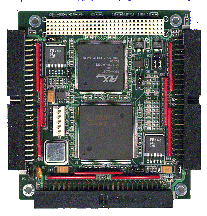
The MESA 4I65 is a general purpose programmable I/O card for
the
PC/104-PLUS bus. The 4I65 uses a 200K gate Xilinx FPGA for
all
logic, so it is truly an Anything I/O card. The FPGA is downloadable
from the PC/104-PLUS bus side, allowing creation of almost any kind of
specialized I/O function, even including micro-controllers in the
FPGA. Several pre-made functions are provided,
including a 12 channel host based servo motor controller,
a
4 or 8 channel micro-controller based servo motor controller (SoftDMC),
and a 8 channel, 32 bit timer counter card capable of running at 100
MHz. VHDL source is provided for all examples. All
I/O bits
are 5V tolerant and can sink 24 mA. Pullup resistors are provided for
all pins so that they may be connected directly to opto-isolators,
contacts etc. The 4I65 has 72 I/O bits available on
three
50 pin connectors, all connectors use I/O module rack compatible
pinouts. Several I/O interface daughter cards are available for the
4I65. These cards include a 4 axis 3A Hbridge, a 2 Axis 3A stepper
motor driver, an analog servo amp. interface, an RS-422/485 interface,
and a debug LED card.
DATASHEET ---
MANUAL---SUPPORT SOFTWARE
--- SOFTDMC
MANUAL
4I38 FPGA based
Anything I/O card
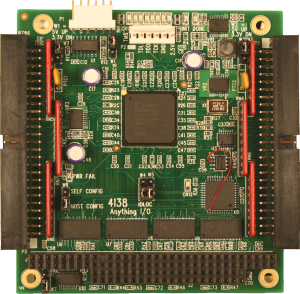
The MESA 4I38 is a general purpose programmable I/O card for
the
PC/104 bus. The 4I38 uses a 1M or 1.5M gate Xilinx Spartan 3 FPGA for
all
logic, so it is truly an Anything I/O card. The FPGA can be
configured from the PC/104 side or can be configured automatically at
power up via the on card serial flash EEPROM. All PC/104 lines are
connected to the FPGA, allowing the 4I38 to be used a a PC/104 bus
master or for testing PC/104 cards. 48 I/O lines are provided via two
50 pin connectors with
I/O
module rack compatible pinouts and interleaved grounds. A full Duplex
RS-422 port is also provided for remote communication.
DATASHEET
---
MANUAL---SUPPORT SOFTWARE
4I39
FPGA based
Anything I/O card with isolated RS-422 interface
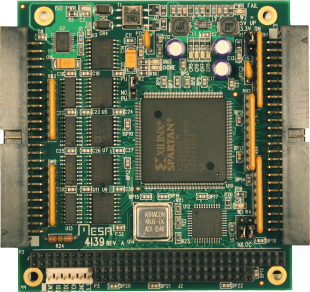
The MESA 4I39 is a general purpose programmable I/O card for
the
PC/104 bus. The 4I39 uses a 200K gate Xilinx FPGA for
all
logic, so it is truly an Anything I/O card. The 4I39 is
designed
for RS-422 applications and provides 8 full duplex isolated RS-422
interfaces. Each interface is capable of 10 Mb per second
communication. The FPGA configuration is downloaded from the PC/104 bus
interface. In addition to the RS-422 I/O, 24 5V tolerant TTL I/O lines
are provided via a 50 pin connector with
I/O
module rack compatible pinout. The 4I39 is useful for motion control
systems, interfacing SSI type encoders, as a general purpose high speed
serial interface card, interfacing legacy hardware and devices with
proprietary protocols.
DATASHEET
---
MANUAL---SUPPORT SOFTWARE
4I34 FPGA based
Anything I/O card
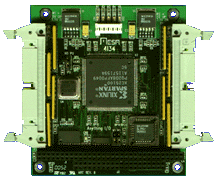
The MESA 4I34 is a general purpose programmable I/O card for
the
PC/104 bus. The 4I34 uses a 100K or 200K gate Xilinx FPGA for all
logic,
so it is truly an Anything I/O card. The FPGA is downloadable
from the PC/104 bus side, allowing creation of almost any kind of
specialized I/O function, including micro-controllers in the
FPGA. Several pre-made functions are provided,
including a
64 channel event capture card, an 8 channel host based servo motor
controller, a 4 channel micro-controller based servo motor controller
(micro-controller CPU built into FPGA), and a 8 channel, 32 bit timer
counter card capable of running at 100 MHz. VHDL source is provided for
all examples. All I/O bits are 5V tolerant and can
sink 24
mA. Pullup resistors are provided for all pins so that they may be
connected directly to opto-isolators, contacts etc.
The
4I34 is available in 2 versions, the 4I34 with 64 I/O bits and the
4I34M with 48 I/O bits. The 4I34 uses two 40 pin connectors with
proprietary pinouts, while the 4I34M uses two 50 pin connectors with
I/O
module rack compatible pinouts and interleaved grounds
DATASHEET ---
MANUAL(4I34)---SUPPORT SOFTWARE
7I60
FPGA based standalone
Anything I/O card
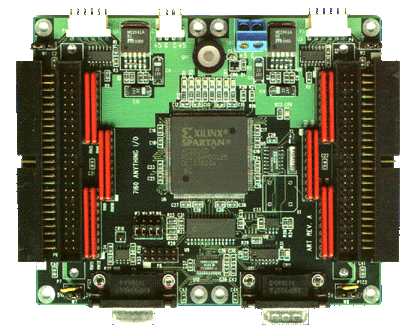
The 7I60 is a standalone (no bus) version of the FPGA based
Anything I/O card series. It provides 96 I/O bits and 4 serial
ports. There are 2 RS-232 ports and 2 RS- 485
ports. One of
the RS-232 serial ports is used for downloading initial
configurations to the on-card Flash EEPROM for FPGA configuration, the
other ports can be used for any purpose. The 96 I/O bits are
available on four 50 pin connectors, 24 bits per connector. The 50 pin
connectors have I/O module rack compatible pinouts. The connector
pinout
uses interleaved grounds for lower crosstalk and controlled impedance.
Socketed pull-up resistor networks (or optional termination networks)
are provided for all I/O bits. PwrGood, Done, Init
and
status LEDs are provided for debugging puposes as are 8 FPGA driven
LEDs
and a FPGA driven beeper. Several I/O interface daughter cards are
available for the 7I60. These cards include a 4 axis 3A Hbridge, a 2
Axis 3A stepper motor driver, an analog servo amp. interface, an
RS-422/485 interface, and a debug LED card. 2 daughter cards can plug
directly onto the 7I60. Many IO configuration files are
provided
with the 7I60 including simple remote I/O, smart remote I/O, 4 and 8
axis servo motion control, 4 and 8 axis microstepping stepper motor
control, multiple channel PWM generator, quadrature counters and more.
VHDL source is provided for all configurations. 2 FPGA system
clocks are provided: a 50MHZ Crystal and a 25, 33, 50, 66, 80 MHz
PLL. The 7I60 uses a 200K gate Xilinx SpartanII FPGA. Free
development tools for The SpartanII are available (Xilinx WebPack) from
Xilinx s web site.
DATASHEET
---
MANUAL---SUPPORT SOFTWARE
--- SOFTDMC
MANUAL
BACK TO HOME PAGE













 interface
interface interface
interface interface
interface interface
interface interface
interface interface
interface







 rd
rd








